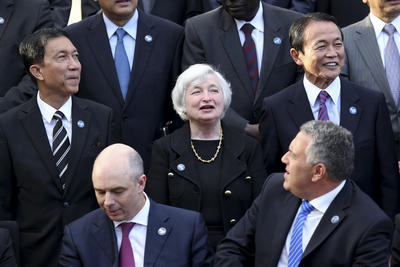How has the G20 assisted global recovery and what’s its future with the restoration of global economic stability?
There’s no way, of course, of easily estimating the impact of the G20 on global economic outcomes over the past five years. But most observers would agree that the combination of decisive action by the US Federal Reserve and Treasury, the G20 commitment at the Washington meeting not to raise trade barriers, and then the signal at the April 2009 London meeting of broadly concerted fiscal expansion and a green light for tripling the ‘firefighting’ capacity of the IMF, all made a critical contribution to turning around expectations and preventing the crisis from sliding into a recession on a scale of that which afflicted the global economy in the 1930s.
The elevation of the G20 to a leaders’ level summit fundamentally changed the structure of global governance. An annual finance ministers’ and central bankers’ meeting of G20 countries was launched after the Asian financial crisis in the late 1990s. It was clear that if the problems of 2008-9 were going to be dealt with effectively, the major emerging economies would need to be engaged. The pre-existence of the ministerial level meeting short-circuited the debate about who would be at the table. The G20 emerged as representative of not only the world’s major economies but also the spectrum of regions around the globe. It has been sufficiently flexible in accommodating other parties that questioning of the group’s legitimacy has died away.
The Ukraine question and developments in Iraq also confront the G20 with its role as a political instrument of global cooperation. A multilateral meeting of leaders provides opportunity as well as challenge in managing the tensions mounting between the United States and Russia over unfolding events in Ukraine or whatever unfolding crisis or instability such as Syria last year and perhaps Iraq this year. These events could, though they need not, cast a shadow over the G20’s possible achievements.
As Kemal Derviş, of the Brookings Institution, and I argue in this week’s lead from the latest East Asia Forum Quarterly, five years after the first leaders’ level meeting, the question now is whether and how G20 summits can really add continuing value to global economic governance now the crisis has receded. ‘There has been a slow but steady global recovery, allowing for a gradual normalisation of monetary policy in the United States and reducing the near panic relating to the euro-zone that prevailed in the past half-decade. This year may witness instability, however, for non-economic reasons, such as the tensions mounting between the United States and Russia and unfolding events in Ukraine or over Iraq’.
How must the G20 adapt to serve its new role?
The main challenge is to create sustainable world growth based on real investment that stimulates total factor productivity gains and provides new, long-term jobs in the value-added chains of the products and services of the future. Laying the foundations for sustained growth through productivity-enhancing reforms is a priority for advanced and emerging economies alike. So too is enabling investment in infrastructure that is productive, especially in emerging markets. The two are closely linked.
It is also time to make sure that key global economic institutions are robust and able to withstand unexpected shocks if and when they occur. Early attempts at reform of established global institutions, such as the IMF and the World Bank, are incomplete and fail to satisfy the requirement that the emerging economies be adequately represented.
More importantly, leaders need to add value, for example, by asking big questions about whether the global trade regime is headed in the right direction, or how to shape a potential investment regime. The scale and structure of the global economy has changed dramatically since the post war institutions were put in place. The nature of international commerce and international capital movements and the presence of large new players like China, India and Brazil mean that the old rules need upgrading or extending. Nor can the global problem of climate change be neglected: whatever the reluctance to acknowledge it, there is a palpable anxiety in the global community, and growing willingness, led by the United States and China who will not be put aside, to do something about it. These are issues on which leaders and the Australian Chair need to give strategic new direction.
As Kemal and I conclude: ‘By far the biggest challenge for each G20 host is the total engagement that must go into providing leadership of the global economy through and beyond the host year. In 2014 the expectations are high that we will see a turning point from the ‘new normal’ to ‘strategically-directed’ G20 summits and hence a new phase in global governance. The task for Australia in 2014 will be to deliver and sustain an emerging sense of strategic direction’.
The essays on the G20 in this issue of EAFQ are based on the book The G20 Summit at Five: Time for Strategic Leadership, the product of a major ANU–Brookings Institution project in the lead-up to this year’s G20 summit. This issue of EAFQ also launches a new feature: four essays on major trends and developments in the region. This feature, Asian Review, will now be a regular in the EAFQ alongside its coverage of a particular theme of importance about Asia’s place in the world.
Peter Drysdale is Editor of the East Asia Forum.

